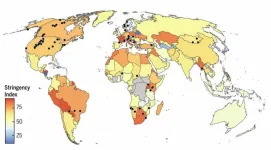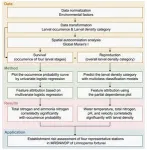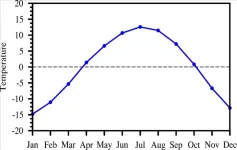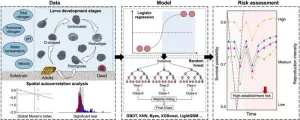(Press-News.org) In the spring of 2020, one country after another went into lockdown as Covid-19 spread across the globe. In some places, e.g. China, the civilian population was kept inside by the authorities. Other countries, like Spain, had a curfew in place for weeks, during which only short trips to the supermarket were allowed.
The lockdowns meant there were suddenly much fewer cars on the roads and people in forests and parks. While we were sitting at home watching Netflix, wild animals emerged from the bushes and edges of the forest. They ventured closer to the roads and cities that had suddenly emptied.
We know this thanks to data from GPS trackers attached to a large number of terrestrial mammals around the world.
Denmark contributed to the survey with data from GPS trackers on four stags from Oustrup Hede a little north of Herning. The stags had been tagged the year before, and this made it possible to compare their behaviour before and after lockdown, explains Peter Sunde, a professor at the Department of Ecoscience at Aarhus University and the person behind the Danish contribution to the research project.
An unparalleled experiment
The lockdown gave researchers across the world a unique opportunity. Never before had modern science been able to completely remove humans from the equation when studying large mammals.
Today, most mammals live close to humans and are affected by human activity on a daily basis. The new findings show that we humans affect wildlife to a much higher degree than we think, explains Peter Sunde.
"The results reveal that our presence hinders animals' ability to move around. All mammals need to find resources to sustain themselves every day, but the data shows that the presence of cars and humans stresses the animals and limits their movements to small empty areas."
"However, during the lockdowns, we saw that the animals roamed closer to roads and cities. This gave them a bigger area to move around in. However, this only applied to areas that were already heavily impacted by humans. The lockdowns had the opposite effect on areas with low human activity. Probably because natural areas were visited by more people than usual,” he says.
More room to romp around
It may sound contradictory, but the researchers behind the study found that animals moved both less and more when humans were stuck at home.
"The figures show that animals generally reacted differently during different types of lockdown. Probably because the disturbance factor decreased in areas with hard lockdowns, while people in countries with soft lockdowns, such as Denmark, spent more time outdoors than before the lockdown," says Peter Sunde.
The researchers looked at different parameters when analysing the tracking data on the animals. One of the parameters is called the 95th percentile. It covers the five percent longest journeys taken by animals based on connecting the GPS positions tracked. Since animals don't move very much most of the time, even when active, the 95th percentile is a better measurement of their mobility on average.
When the research team looked at how much the animals moved on an hourly basis, the figure across species and countries was on average 12 percent lower in the spring of 2020 compared to the same period the year before. This means the animals made fewer or shorter "long journeys" on average.
"We don't know for sure why this is, but it's likely that they were less bothered by human activity and therefore didn't need to move as much," he says.
But when the researchers looked at the 95th percentile over ten days instead of on an hourly basis, the picture was slightly different: The animals travelled greater distances than normal in areas with hard lockdowns.
"Whereas the hour-to-hour movements of the animals are tactical responses to what’s happening in their immediate vicinity, their patterns of movement over a ten-day period reflect more strategic choices. The animals go where they assess there’s more food and less danger,” he says and continues:
“The study clearly shows that, on a ten-day basis, the animals travelled longer distances in areas where human activity had decreased. The absence of humans gave them a larger area to roam and better opportunities to optimise their own situation - and they took advantage of this. Conversely, their roaming area decreased in areas with soft lockdowns because humans flocked into natural areas.”
Taking better care of wild animals
The corona pandemic has been over for a while, and human activity has returned to normal. Animals, especially in densely populated areas, have once again had to adapt their activity and movement to humans.
This affects both their ability to forage and the amount of contact different species have with each other. But the unique research results show that we can do something about it.
“We can use this new knowledge to become better at planning our activities in nature. We now know that our mere presence dampens the activity of many species. This can ultimately have an impact on where different mammal species can live and in what numbers. We should bear this in mind when planning new constructions, roads or even small forest paths. “Human activity puts a strain on many animals,” says Peter Sunde, and continues:
"But that doesn't mean we shouldn’t spend time in forests. However, the people who organise public access to nature need to know that this has consequences for wild animals. For many years, Danish policy has centred on getting people to use nature as much as possible,” he says.
In recent years, many new shelters and mountain-bike tracks have been constructed around Denmark. And even though that is good for humans, it places an even greater strain on wild animals.
“We still know very little about how increased human activity in nature, such as overnight stays and cycling, impacts the prevalence and population of animals. But I can well imagine that increased recreational use of nature might lower the population densities of disturbance-sensitive species such as deer," he says.
Animals in Denmark probably didn't benefit from the lockdown
Unlike many other countries, Denmark never had an outright curfew. Most shops, attractions and sports activities closed, which meant that people flocked in droves into nature.
Figures from the Danish Nature Agency show that there were twice as many people in state-owned natural areas than before lockdown. Danish animals probably did not get as big a break from humans as animals in other countries.
“The impact on Danish wildlife was most likely the opposite. An increased number of humans in nature probably put an even greater strain on animals than usual,” says Peter Sunde, and continues:
“I live in Mols Bjerge myself, and I’m telling you, it was just like walking down a high street at rush hour. The paths were chock full of people. I’ve never seen that many people in nature before.”
END
The corona lockdowns changed the behavior of wild animals around the world
GPS trackers on 43 species across the globe show that animals changed their behaviour when humans stayed indoors. These were the results of an international research project that Aarhus University took part in
2023-08-25
ELSE PRESS RELEASES FROM THIS DATE:
Starch discovery reaps benefits for brewing, baking and milling industries
2023-08-25
Research has brought clarity to the longstanding question of how starch granules form in the seeds of Triticeae crops – wheat, barley, and rye - unlocking diverse potential benefits for numerous industries and for human health.
Starch in wheat, maize, rice and potatoes is a vital energy-giving part of our diet and a key ingredient in many industrial applications from brewing and baking to the production of paper, glue, textiles, and construction materials.
Starch granules of different crops vary greatly in size and shape. Wheat starch (and those of other Triticeae) uniquely have two distinct types of granules: large A-type granules and smaller B-type granules.
The ratio ...
Insights from past warming: Enhanced temperature seasonality in China during the mid-Holocene
2023-08-25
Against the background of global warming, the temperature seasonality has changed obviously at global and regional scales, which has exerted significant ecological and societal impacts. As a populous country highly sensitive to climate change, China experienced an overall decreasing trend of the amplitude of the annual temperature cycle during 1961–2007. This national-scale average downward trend is likely to continue throughout the rest of the 21st century according to future projections, with a spatially robust decrease in most regions but increases at more local scales. ...
A new analytical framework assesses the risk of invasive golden mussels in water diversion projects
2023-08-25
Water diversion projects, though meant to correct unequal water distribution, unintentionally promote the growth of invasive aquatic species like the golden mussel. This fast-reproducing, substrate-clinging mussel causes biofouling, damaging structures and water quality, and leading to socio-economic and ecological issues. Yet, how environmental factors aid this colonization remains largely unclear, necessitating further research.
In a ground-breaking study published on 24 July 2023 in the journal Environmental Science and Ecotechnology, researchers from Tsinghua University, utilized logistic ...
Kessler Foundation team examines influence of processing speed on treatment benefits of cognitive rehabilitation for individuals with traumatic brain injury
2023-08-25
East Hanover, NJ. August 25, 2023. Scientists at Kessler Foundation reported results from a randomized controlled trial examining the influence of processing speed on treatment benefits of the Kessler Foundation modified Story Memory Technique (KF-mSMT®) in individuals with moderate to severe traumatic brain injury (TBI). They found that processing speed played a role in benefit from the KF-mSMT on a list learning task, but not on a prose memory task.
Their article, “The influence of information processing speed on benefit from learning and memory rehabilitation in TBI: a sub-analysis of the TBI-MEM trial,” (do: 10.1080/02699052.2023.2216024) ...
Drexel develops new innovative model for cell and gene therapy education with grants from Bristol Myers Squibb
2023-08-25
Drexel University’s School of Biomedical Engineering, Science and Health Systems, in collaboration with Drexel’s College of Medicine, has received grants from the pharmaceutical company Bristol Myers Squibb, to support the education and training of diverse and talented students looking to pursue careers in cell and gene therapy.
The funding provided close to $1 million to support the creation of a new Cell and Gene Therapy Technology, Engineering, Analytics, Manufacturing, & Science academic program, known as CGT-TEAMS, that launched this summer ...
Waking up to Asian economic miracles
2023-08-25
By Alistair Jones
SMU Office of Research – American economist Milton Friedman cast a long shadow with his 1970 article, 'A Friedman Doctrine: The Social Responsibility of Business is to Increase its Profits'. For decades, it became a touchstone for free-market economies, interpreted as the sole purpose of a firm was to make money for its shareholders.
But there's an alternative dynamic, an awareness that companies also have a responsibility to stakeholders – such as employees, customers, suppliers, communities and government. This stakeholder capitalism has a corporate purpose beyond profit maximisation, aiming ...
Food recognition and logging: New research focuses on local Singaporean food
2023-08-25
By Stuart Pallister
SMU Office of Research – Two Singapore Management University researchers have embarked on a three-year project, funded by Singapore’s Ministry of Education, to ‘de-bias’ digital food recognition and develop a more robust machine learning system capable of correctly identifying Singapore’s multiracial food.
The two researchers from SMU’s School of Computing and Information Sciences, Professor Ngo Chong Wah and Associate Professor Rajesh Balan, already have extensive ...
Augusta University researcher calls for modernizing the UN's traditional approach to population replacement measurement
2023-08-25
AUGUSTA, Ga. (August 24, 2023) – In 2021, Arni S.R. Srinivasa Rao, PhD, presented a critique on the formula of net population replacement levels at the International Population Conference 2021 in Hyderabad, India. It was one of the first times he had publicly shared his latest research on population replacement commonly calculated through net reproduction rate (NRR). A blog on the same topic written by him also appeared in Population Association of America’s PAA Affairs.
Rao, the director at the Laboratory for Theory and Mathematical Modeling in the Division of Infectious Diseases at the Medical College of Georgia at Augusta University, has published ...
As Medicaid ‘unwinding’ continues and more states expand eligibility, Michigan report provides key insights
2023-08-25
At a pivotal time for Medicaid health coverage for Americans with low incomes, a report on the impacts of Michigan’s Medicaid expansion shows very positive effects, as well as opportunities for continued improvements.
The report was produced by the University of Michigan Institute for Healthcare Policy and Innovation as part of its evaluation of the Healthy Michigan Plan, Michigan’s Medicaid expansion program. The program currently has about 1 million enrollees and was signed into law 10 years ago this September.
On the whole, the report shows that the Healthy Michigan Plan has been effective at:
reducing uninsurance,
supporting ...
Smokers who start below age 20 become more addicted and find it difficult to quit
2023-08-25
Amsterdam, Netherlands – 25 Aug 2023: Researchers urge governments to raise the legal age to purchase cigarettes to 22 years or higher as study finds it becomes less addictive and easier to quit as people get older. The research is presented at ESC Congress 2023.1
In 2020, more than one in five people worldwide used tobacco.2 Tobacco kills up to half of its users.2 Smokers below the age of 50 years have a five-fold higher risk of developing cardiovascular disease compared with their non-smoking peers.3 The legal age to purchase tobacco is 18 years old in many ...
LAST 30 PRESS RELEASES:
Transient Pauli blocking for broadband ultrafast optical switching
Political polarization can spur CO2 emissions, stymie climate action
Researchers develop new strategy for improving inverted perovskite solar cells
Yes! The role of YAP and CTGF as potential therapeutic targets for preventing severe liver disease
Pancreatic cancer may begin hiding from the immune system earlier than we thought
Robotic wing inspired by nature delivers leap in underwater stability
A clinical reveals that aniridia causes a progressive loss of corneal sensitivity
Fossil amber reveals the secret lives of Cretaceous ants
Predicting extreme rainfall through novel spatial modeling
The Lancet: First-ever in-utero stem cell therapy for fetal spina bifida repair is safe, study finds
Nanoplastics can interact with Salmonella to affect food safety, study shows
Eric Moore, M.D., elected to Mayo Clinic Board of Trustees
NYU named “research powerhouse” in new analysis
New polymer materials may offer breakthrough solution for hard-to-remove PFAS in water
Biochar can either curb or boost greenhouse gas emissions depending on soil conditions, new study finds
Nanobiochar emerges as a next generation solution for cleaner water, healthier soils, and resilient ecosystems
Study finds more parents saying ‘No’ to vitamin K, putting babies’ brains at risk
Scientists develop new gut health measure that tracks disease
Rice gene discovery could cut fertiliser use while protecting yields
Jumping ‘DNA parasites’ linked to early stages of tumour formation
Ultra-sensitive CAR T cells provide potential strategy to treat solid tumors
Early Neanderthal-Human interbreeding was strongly sex biased
North American bird declines are widespread and accelerating in agricultural hotspots
Researchers recommend strategies for improved genetic privacy legislation
How birds achieve sweet success
More sensitive cell therapy may be a HIT against solid cancers
Scientists map how aging reshapes cells across the entire mammalian body
Hotspots of accelerated bird decline linked to agricultural activity
How ancient attraction shaped the human genome
NJIT faculty named Senior Members of the National Academy of Inventors
[Press-News.org] The corona lockdowns changed the behavior of wild animals around the worldGPS trackers on 43 species across the globe show that animals changed their behaviour when humans stayed indoors. These were the results of an international research project that Aarhus University took part in








